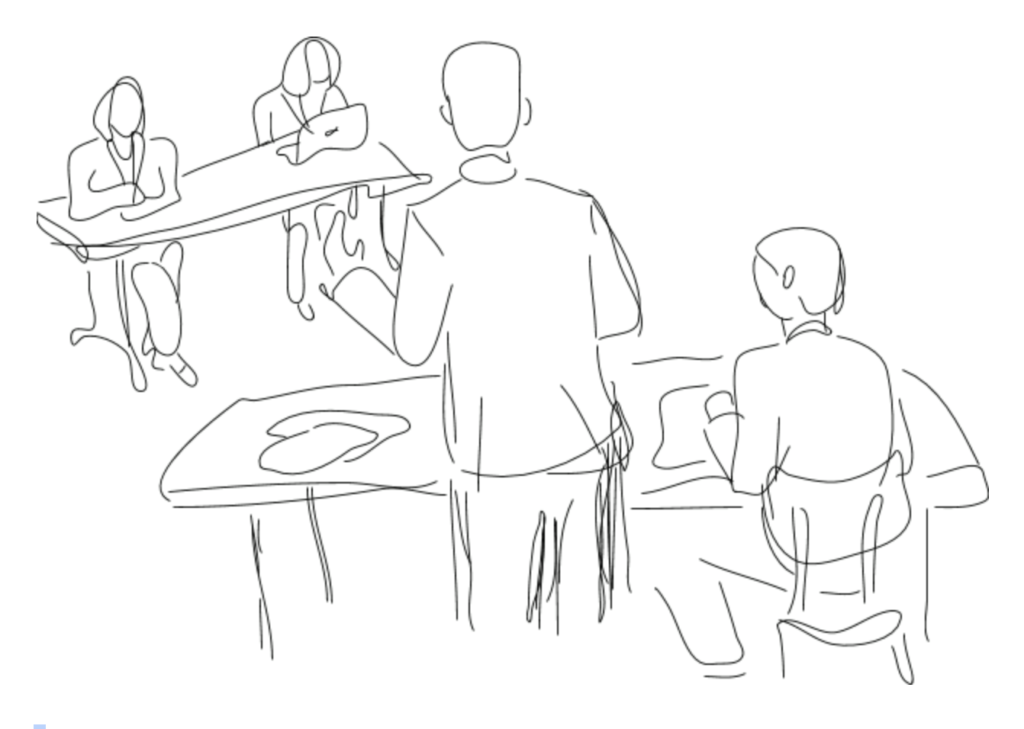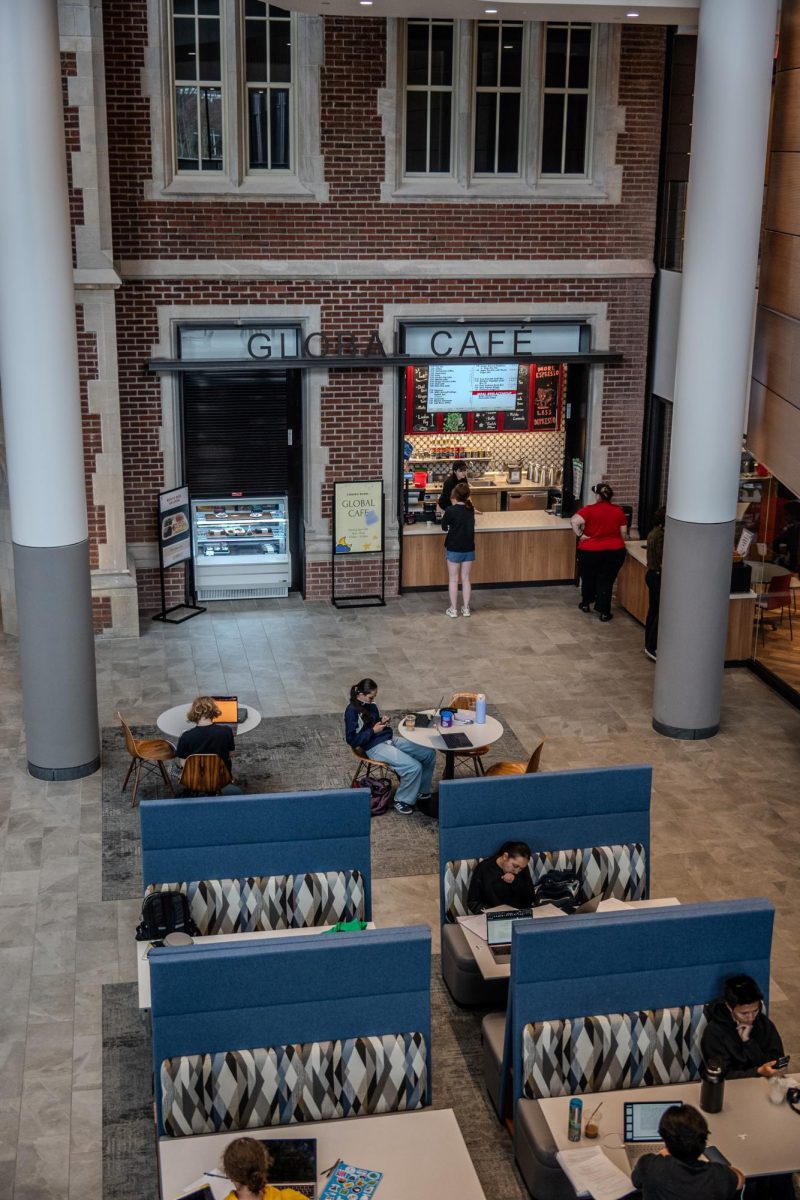By Zoe Fruchter and Chloe Wray
fruchter@grinnell.edu
wraychlo@grinnell.edu
The National Labor Relations Board (NLRB) hearing as to whether the Union of Grinnell Student Dining Workers (UGSDW) could hold an election to expand their membership to all student workers concluded on Thursday, Oct. 18. The hearing began on Wednesday, Oct. 17.
Judge Martha Freeberg, an appointee of the National Labor Relations Board (NLRB), presided over the banquet room of Grinnell College Golf Course, where the hearing was held.
Cory McCartan ’19, UGSDW advisor and founder, and Sam Xu ’20, UGSDW board member-at-large, argued on behalf of the Union’s petition. President Raynard Kington and attorneys Frank Harty and Thomas Cunningham from Nyemaster Goode, P.C. represented Grinnell College, the employer and respondent to UGSDW’s petition.
Typically, the NLRB will hold an election in which at least 50 percent and one of the proposed unit, in this case student workers, must vote in favor of unionizing to grant collective bargaining power. This was not the case at Grinnell.
According to Jacob Schneyer ’21, UGSDW board member-at-large, the College’s argument is grounded in the notion that students are not employees and therefore do not have the right to unionize, thus blocking the proposed election. Even if the NLRB decides in favor of UGSDW, Schneyer said the two parties would still need to meet a neutral agreement to hold the election.
On Oct. 17, the College called five witnesses to testify before Judge Freeberg: Grinnell College President Raynard Kington, Maria Tapias, professor of anthropology and associate dean, Brad Lindberg, assistant vice president of enrollment and director of financial aid, Mark Watts, human resource training and student employment coordinator and Susan Sanning, associate dean and director of service and social innovation.
The Union called Nancy Combs, controller and assistant treasurer, as their first witness on Oct. 17. The following day, UGSDW called four students to testify about the economic necessity of their employment at the College: Union President Quinn Ercolani ’20, Caitlin Richter ’19, Peter Cipriano ’19 and Allyson Leicht ’19.
Following the Union’s witnesses, UGSDW and the College delivered their final statements.
Cory McCartan, UGSDW advisor and founder, said that student workers are statutory employees of the College and thus have the right to collective bargaining. McCartan argued against the College’s stance that students’ jobs are educational and thus not deserving of union status, saying that a job being instructive has no connection to the economic condition of the students or their need for collective bargaining.
McCartan invoked the NLRB’s 2016 decision The Trustees of Columbia University in the City of New York and Graduate Workers of Columbia as precedent, noting that the NLRB decided that student workers were eligible for collective bargaining in this case.
Finally, McCartan addressed the College’s allusions to wealth stratification throughout the hearing: “If the employer is concerned about inequity between wealthy and low-income students, they should take a look at their current system in which many low-income students have to work much more than their peers.”
Harty claimed that the petitioner’s witnesses proved the College’s point. Harty expressed that witnesses corroborated Grinnell College President Raynard Kington’s testimony that campus jobs were primarily educational, and that students attend the College for higher education, not working, thus they are not employees subject to NLRB review.
Harty went on to state that the fear of stratification was real, and that if collective bargaining were granted, work opportunities would be limited to those with the most need. He concluded that unionizing would violate FERPA and FAFSA, jeopardizing students’ rights to financial privacy. Harty denied comment to The S&B.
According to UGSDW members, the process of choosing an appropriate setting for the hearing presented difficulty.
Originally scheduled to be held in Minneapolis, the Regional Office headquarters of the NLRB, the hearing was moved to Newton, IA. However, UGSDW objected to both locations, expressing concerns over travel costs and missing school.
To hold the hearing in Grinnell, UGSDW agreed to drop the unfair labor charge they filed at the same time as the petition in response to an April 18, 2018 statement from President Kington.
In a Special Campus Memo emailed to all students, President Kington stated that unionizing all student workers “… could have an adverse impact on our students who receive financial aid through the work-study program.”
The Union interpreted Kington’s statement as a threat to student’s financial aid.
After the Union dropped their unfair labor charge, the College proposed the Golf Course as the hearing location, ostensibly due to a lack of availability of other spaces on campus.
“We had to let them get away with that [unfair labor practice] in order to have the hearing on campus and allow the student body to see firsthand the administration denying them their rights,” said Quinn Ercolani ’20, UGSDW president.
Facing two established professional lawyers, McCartan and Xu relied on Xu’s two years of Mock Trial experience and personal research. “The internet is a great place,” McCartan said.
“The College’s denial of our rights is negatively impacting my educational experience because I can’t focus on my classes at all when the College has hired two high powered union-busting attorneys to waste my time for two days,” McCartan said.
Lisa Lacher, senior content strategist for media relations in the College’s Office of Communications, wrote in an email to The S&B, “because there is a pending matter before the National Labor Relations Board, we [the College] think it prudent not to comment.”
Following the hearing, the NLRB will notify both parties if they can administer an election to expand the union. Should the NLRB rule in favor of UGSDW’s petition, the election will take place in Joe Rosenfield Center (JRC) 101 on Friday Nov. 9, from 9 a.m. to 5 p.m. Any undergraduate employee of the College who logged hours between Sept. 16, 2018 and Oct. 15, 2018 will be able to vote.





























































Kesho Scitt • Oct 20, 2018 at 6:21 am
Thank you for asking me to participate. You all are doing such a powerful job creating a pathway for those Grinnell students in the future. Bringing dignity to work is an American act of justice and freedom. We are what we stand up for. ??